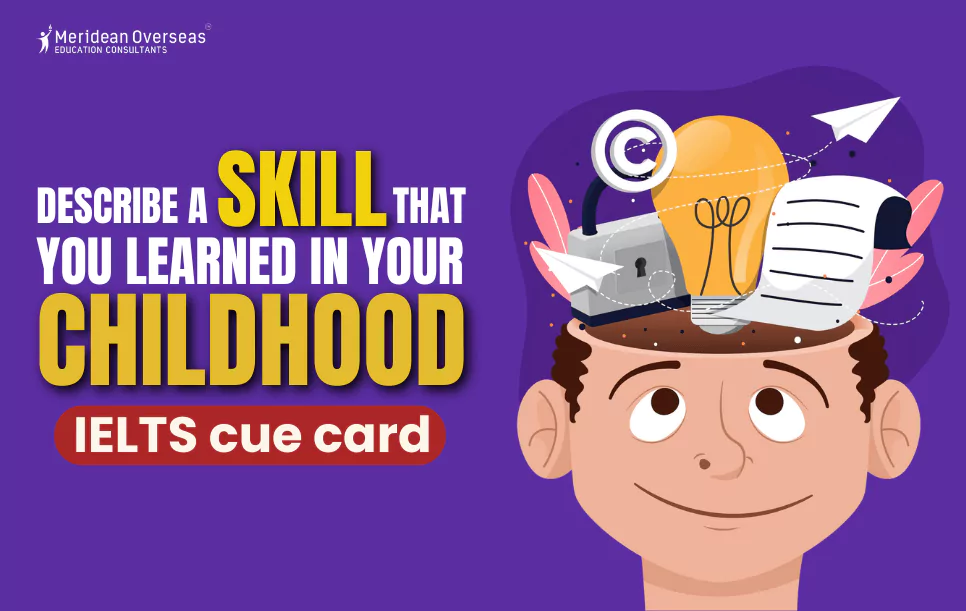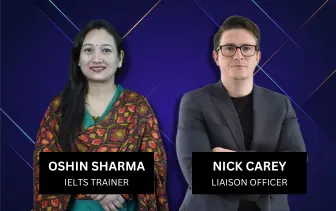
Announcements

Announcements

Meridean Overseas
Updated On 12 April 2024 & Read Time 9 minutes
10.8k
One of the four components of the IELTS is the Speaking test. The examiner evaluates your speaking abilities in this module and assigns you a score based on how well you do. They examine your speech's accuracy, fluency, grammatical range, and pronunciation. After that, they assign you a band score according to how successfully you managed these variables.
They will initially give you a cue card with a topic on it. They will next invite you to talk for two to three minutes about the subject. In this blog, we have included some sample answers to demonstrate how to answer cue card questions. We are using the practice test topic "Describe a skill that you learned in your childhood" as an example.
Table of Contents
The years we spend learning and growing up are quite important, and the talents we pick up then frequently stick with us throughout our lives.

When I think back on my own upbringing, I recognise that I picked up a certain talent that has served me well all through my life. In addition to being a useful skill, it serves as the basis for numerous other facets of my life.
One of the most important things I learned as a kid was how to swim. It wasn't just fun; it was also really important for staying safe around water. Starting to swim when I was young made a big difference in my life. In third grade, I began learning how to swim. It was all about figuring out how to move smoothly in water and how to be safe when I was near pools or lakes.
I took swimming lessons at a nearby pool under the guidance of a coach who knew a lot about swimming. I learned basic strokes like freestyle and backstroke. We practised often to improve our ability to swim longer distances without getting tired. I also swam with my family and friends, which helped me improve even more.
Learning to swim is essential for staying safe in and around water. It not only helps you avoid drowning but also gives you confidence and keeps you fit. Swimming also teaches you things like discipline and how to keep trying even when things get tough. Apart from this, learning to swim also becomes essential when it comes to water sports.
One strong memory I have from my early swimming lessons is when I finally faced my fear of jumping into the deep end. Conquering that fear felt really good and taught me always to tackle challenges directly.
Also, Read: Describe something you do regularly that helps you work and study better
One of my favourite things that I was keen to learn during my childhood days was playing the guitar. I had a very different kind of fascination with learning guitar.
When I was in sixth grade, I started learning to play the guitar at school. I was really excited to try something new! My school had just introduced music classes, and I couldn't wait to pick up a guitar for the first time.
Learning the guitar wasn't easy at first. I had to be patient and keep practising. Our music teacher, Mr. Johnson, showed us how to hold the guitar, tune the strings, and play basic chords. After school, I spent a lot of time practising at home. It was tough on my fingers, but I loved getting lost in the music. Over time, I got better at playing melodies and songs. I practised for hours, trying to copy the tunes I learned in class. Each day, I improved and began to understand rhythm and melody better.
I think it's really important to learn skills like playing an instrument when you're young. They help you become a well-rounded person who can face challenges and think creatively. Learning the guitar made me appreciate art more and sparked a passion that I still have today. It was a great way for me to express myself and relax, especially when things were stressful.
Overall, learning to play the guitar was a big part of my life. It taught me skills that I still use today, like discipline and creativity. I'm thankful for the chance to have learned something so special during my childhood. It showed me the importance of sticking with something and not giving up. I learned that progress takes time and effort.
Also, Read: IELTS cue card - Describe a successful person who you once studied or worked with
Embark and excel in your study abroad journey with our expert team!

I learned various skills during my childhood, like cooking, sketching, cycling, etc. But there is one particular skill that I am very proud of.
In my childhood, I learned classical dance, which was a skill that deeply influenced my life. It taught me grace and discipline and helped shape my character through art. I started learning Bharatanatyam in the fourth grade. This dance style involves intricate footwork, hand gestures (mudras), and facial expressions to tell stories from ancient myths and folklore.
I attended dance classes twice a week after school from a professional Bharatnatyam teacher. At first, we focused on learning basic postures and steps. I practised a lot at home, spending hours in front of the mirror to perfect each move. As time went on, our teacher introduced more complex choreography and taught us how to tell stories through dance. I remember spending afternoons refining my techniques and feeling proud of my progress.
Learning classical dance wasn't just about physical skills; it also taught me important life lessons like discipline, patience, and perseverance. It broadened my cultural understanding and appreciation for the arts. These skills contribute to overall development by fostering creativity and self-expression, which are important in today's tech-driven world.
Overall, learning classical dance has added to my skills, which I am proud of. It has taught me how to express my emotions through music and helped me relieve my stress.
Also, read: IELTS cue card - Describe an occasion when someone or something made noise
After speaking for 2 to 3 minutes on the above cue card topic, the examiner will be asking certain follow-up questions in the 3rd part of the test related to a similar topic. So, below are some of the follow-up questions that the examiner might ask you:
Question: Where do children learn skills in your country?
Answer: We place too much emphasis on skill development in our nation. When it comes to youngsters, the school is the primary setting where they can acquire talents such as sketching, music, dance, art, and so on. In addition, a lot of pupils enrol in different schools where they study future skills such as cricket academy, basketball, hockey, etc. Moreover, in some households, parents are the ones responsible for educating their children on a variety of future abilities.
Question: What are the differences between children’s and adults’ learning skills?
Answer: Children's learning abilities and adults' learning abilities differ, sometimes in the interest of play. Since they have plenty of time, children prefer to avoid seeing outcomes from their talents right away. Adults are now in a position where they must use their skills and work to support their families and themselves financially. Thus, the training they receive must be career-specific. The adults might support themselves in their business or obtain work by learning career-specific skills.
Question: Do you believe that children today have the same opportunities to learn practical skills like the one you learned in your childhood?
Answer: Today's kids may learn a wide range of useful skills from a variety of resources, and technological improvements are solely responsible for this. But there's less chance of being in nature now since growth is so quick and people are so busy. Due to the rapid urbanisation process, villages and woodlands are being converted into cities.
Question: What skills do you think teenagers should have?
Answer: The ability to communicate effectively is the most important skill each youngster should possess. They ought to have good body language as well. Apart from this, they need to be proficient in digital technology tools. Possessing these abilities makes it simple for individuals to steer their lives in the direction of an amazing trajectory.
Also, Read: IELTS speaking cue - Describe a time when you helped someone
Boost your IELTS score with effective practice using these sample papers.
Get Your Free Guide
For the IELTS speaking cue card topic "Describe a skill that you learned in your childhood," which is mentioned above, several sample responses and follow-up questions are available. They could be a fantastic source of ideas for the IELTS speaking cue card section. But keep in mind that you must modify your vocabulary and delivery style in order to do it properly. Remember that you can easily ace IELTS speaking cue card questions with the correct strategy and regular practice.
We hope now you have an idea of how to answer the “Describe a skill that you learned in your childhood” type of questions in your IELTS speaking test. But, if you want to get further details or would like to prepare for IELTS, you can contact our expert counsellors at Meridean Overseas Education Consultants (MOEC). You can also take free online counselling through our website. Our expert counsellors will provide you with the best support and guidance you need for admission and visa. In addition, they will help you shortlist the universities according to your profile. For more information or any queries, contact application02@meridean.org or 1800-1230-00011.

Contact MOEC Experts for Study Abroad Guidance!
By using our site, you agree to our use of cookies.

Hurry up before admissions close.

Contact MOEC Experts for Study Abroad Guidance!
